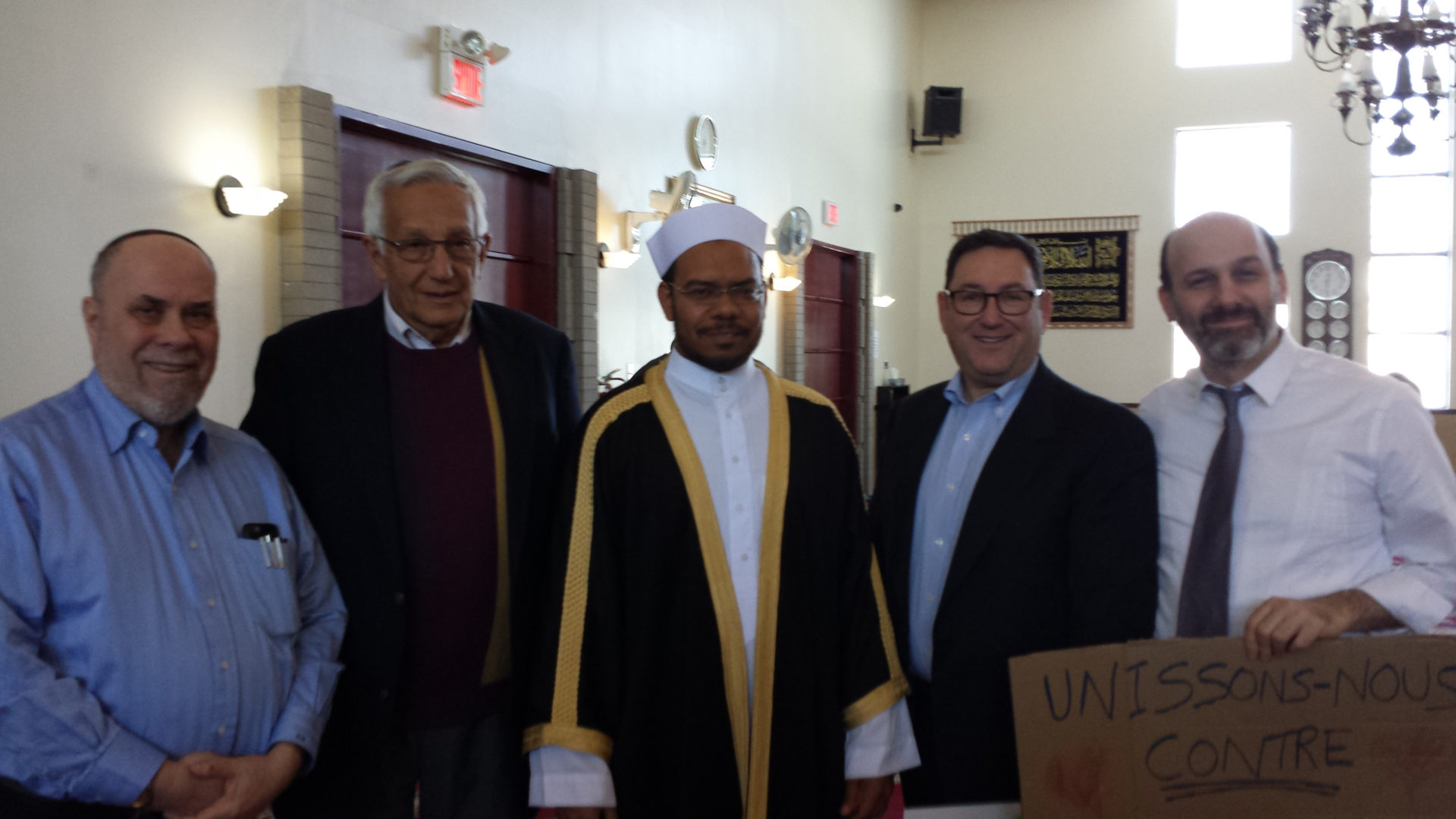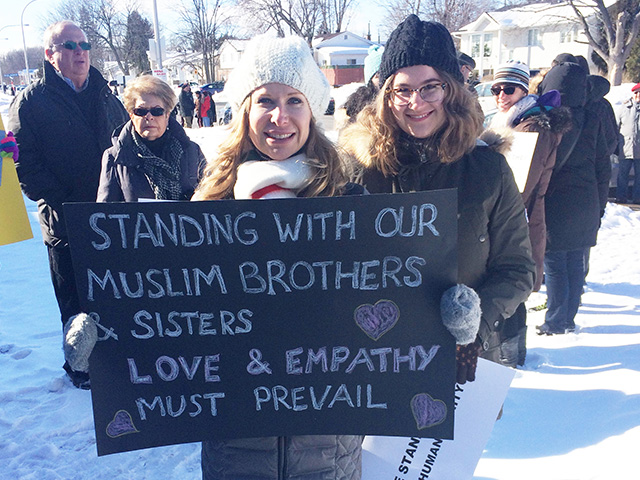“We wish we could have come in a time of joy instead of grief,” Rabbi Mordechai Zeitz told members of a mosque in the Montreal West Island suburb of Dollard des Ormeaux.
It was the first time Rabbi Zeitz, rabbi emeritus of Congregation Beth Tikvah, had been inside the Canadian Islamic Centre al-Jamieh, not far from his synagogue. He was among about 50 men and women of all ages, mostly from his congregation, who came to the mosque on Feb. 3 to express their solidarity and sympathy with their Muslim neighbours.
Most, like Rabbi Zeitz, had never been inside the mosque and had had little contact with the approximately 1,200 people who worship there. The mosque is a former synagogue, Congregation Adat Reim, which was sold to the Muslims around 2000.
READ: HUNDREDS OF JEWS FORM ‘RINGS OF PEACE’ OUTSIDE TORONTO MOSQUES
The visitors were thanked profusely and received warmly by leaders and those gathering for Friday afternoon prayers. Some visitors brought flowers.
Then they moved outside to hold hand-made signs with messages such as “Unissons contre le haine” (“Unite against hate”) and “We Stand with our Muslim Brothers and Sisters/Love & Empathy Must Prevail.”
The former was held up by the four rabbis present, Zeitz, Lionel Moses of Shaare Zion Congregation, Schachar Orenstein of the Spanish and Portuguese Synagogue, and Michael Whitman of Congregation Adath Israel, who had helped organize this gesture with McGill University’s International Community Action Network, formerly the McGill Middle East Peace Program.
The latter sign was made by Elisa Garfinkle and her 15-year-old daughter, Lauren. They had come on the day after the shooting to lay flowers and a note at the mosque door, and were surprised no one else was there.

“We care deeply. There should be no boundaries between different religions. We are all human beings,” said Elisa. “We raise our kids with ‘never again,’ but it keeps happening.”
Cantor Heather Batchelor sang the traditional Angels of Shabbat song. There were repeated mutual greetings of “Shalom aleichem” and “Salaam alaikum,” along with handshakes and hugs.
READ: JEWISH GROUPS EXPRESS HORROR AT QUEBEC CITY MOSQUE SHOOTING
The display of solidarity was replicated in Toronto, where about 300 members of the Jewish community held hands and circled Toronto’s Imdadul Islamic Centre during Friday prayers.
Organized by Rabbi Yael Splansky, spiritual leader of Holy Blossom Temple and mobilized by a last-minute social media campaign and through direct emails, the Imdadul “ring of peace” was one of at least seven held in the Toronto area. Others were held in cities across Canada.
In Montreal, Samer Majzoub, president of the Canadian Muslim Forum, said Muslims and Jews have in common the experience of hatred and “blood,” in the form of Islamophobia and anti-Semitism. He expressed frustration with the rhetoric in Quebec, including from some politicians, that he thinks is fanning those feelings.
“I do not believe he [the Quebec mosque killer] was crazy. I don’t like the word ‘lone wolf,’” Majzoub said. “It is hatred unleashed under freedom of expression… Enough is enough of so-called freedom of expression. Just as on the highway you can’t go past a red light or a stop sign, there is a limit.”
Such a show of respect by the Jewish community, he said, “sends a strong message that the terrorists cannot create friction among us.”
Also speaking were mosque board member Salim Chatila and Imam Owis El Nagar. “I’m speechless seeing you all here, united against what is going on,” Chatila said: “We all know that fanaticism has no religion. We are all suffering from this situation. The best we can do is be united together for a better future.”
Rabbi Whitman responded, “When we saw the news we felt exactly as if it happened at one of our synagogue and to our families. Anyone who hurts you, hurts us… As Jews, we have been there.
“We are required by God and by Judaism to show empathy to every human being. You are our cousins, our brothers and sisters.”
Rabbi Zeitz afterward said he hoped the limited contact his community has had with the mosque in the past may change and a dialogue can develop. “We have made an important statement… the fact that they were so receptive to us is also significant.”
Henry Topas, a Beth Tikvah member for 41 years and a cantor, has been to the mosque a few times, notably last year when the first Syrian refugees were arriving. Beth Tikvah, which is famous for its annual bazaar, opened its doors to them and provided clothing and other necessities.
Meanwhile, Simon Jacobs, a leader of the small Quebec City Jewish community, attended the memorial service for three of the victims, held at the convention centre there on Feb. 3.
Jacobs, a past president of Congregation Beth Israel Ohev Sholom, said that while his community has never had substantial contact with the mosque, the tragedy is felt keenly.
In 2002, the synagogue was damaged by a pipe bomb, a crime for which no one was ever arrested. Jacobs, a historian of the city’s Jewish community, estimates about 150 to200 Jews live in the provincial capital today, many unaffiliated.
The shooting has put his congregation on edge, but he said it’s grateful to the police who have stepped up patrols of the synagogue. Members are more watchful now about who enters the building.
“While we are more alert, there is a sense that to close down would be to give in to terrorism,” Jacobs said.
